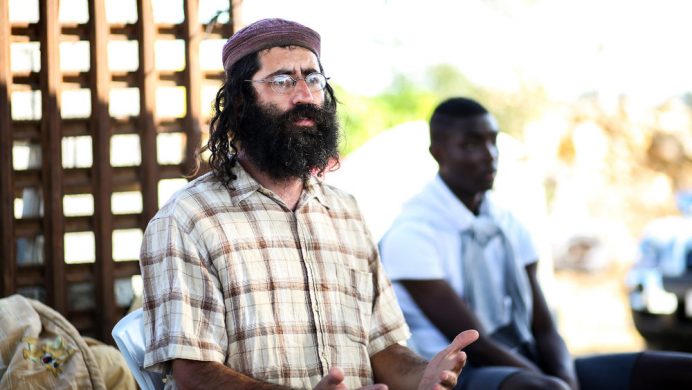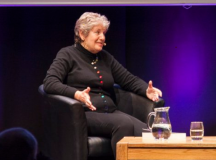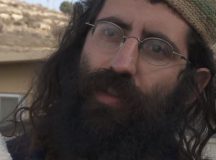The Jewish people’s entrance into the Land of Israel begins with the walls of Jericho tumbling down. And the current period in our calendar – the three weeks following the walls of Jerusalem being breached leading to the destruction of the Temple – marks the exile of our people from that land.
Today’s Jewish headlines are laden with a struggle regarding those walls – in how they nurture us, hold us back, protect us or blind us. Walls clearly have many functions, and as we dare to dream of redemption – whether Daniel Gordis or Peter Beinart – the question of how those walls are experienced by the ‘Other’ takes on prime importance. The age-old tension that has been an essential axis of Zionism’s evolution between the survivalism of the particular or the universalist aspirations again rears its head. Don’t these walls allow us to nurture a Jewish renaissance within, while at the same time cutting us off from the presence and call of our neighbour/foe?
From a glance across social media, Beinart’s piece and the rebuttals seem to embed the two camps, (as is the tendency these days), instead of providing a rampart from which to recognise the truths, experience and hopes from both perspectives. Each speak with a tone determined to carry their reader into their domain, as each have stopped trying to live on the fence and are wielding their conclusions as a battering ram against the other’s worldview. The pathos seems to derive from the conviction that both opinions see themselves as struggling for the heart of what this Jewish story is all about, and the other as an opposing force.
Beinart is right to call out all the dangers. He is adept at owning up to blame. He describes his own process of shifting opinion as self-critical and in response to the realities and contradictions he sees on the ground. I’d coarsely summarise his position on heading towards a one-state based reality, as ‘taking down the walls’ – to remove the structure that has held the Jewish-Israeli mainstream and seek a new future. Perhaps on a deeper level it’s about liberating Judaism from nationalism – that truly evil word of previous centuries. ‘We can’t do it better’ he seems to be saying. ‘And if our version isn’t different than any other national project, we should shift the focus of our peoplehood from that nationalist form’.
That suggestion sounds like suicide to the national project for Gordis and many others. But beyond the critique against projecting a Palestinian partner that Gordis doesn’t see existing, his response bristles with something else. It seems clear that Beinart’s offence is disregarding the trauma of the Israeli experience at Palestinian violent resistance and psychoanalysing it as a result of the Holocausts trauma and obsession. Beinart seemingly feels that that Israeli pain and fear less, and has placed the universal before their particular, lived experience. The inherent tension here between the American liberal Jewish experience and the Israeli Jewish experience of fight or flight is on full-display, and the scathing paragraph about Beinart’s allegiance is the result.
Beinart seeks to tempt us again to abandon our identity based on our pain and loss for a freer Judaism. Jerusalem for Yavne, where, as the capital lay besieged by the Romans in the first century CE, an intellectual elite escaped to reimagine Judaism anew.
The hope that this removing of the walls for a utopian one-state paradise of equality and peace sure sounds tempting from one side. Yet potentially suicidal from the other.
Perhaps it is the role of the Jew from the Diaspora to see ‘how we look’ from the outside. But this vantage point has an inherent challenge, in that it comes from outside the walls. And it clearly describes a reality that is far from what most Israelis live and experience.
But an even deeper sense of betrayal seethes in Gordis’ words. For in Beinart’s willingness to remove the national structure of a Jewish state, he seems to suggest that the project inside the walls hasn’t justified itself as worthy of preserving.
Walls ensure that we can’t see. In fact, one of the defence-based arguments against walls is that they cut you off from what’s happening on the other side. But the more insidious walls in this land are those which keep us from acknowledging the other side’s roots and belonging to this land. And from seeing each other’s experience in this conflict.
Equality. Survival.
Taking a wall down between two narratives is a powerful statement about recognising equality. For Israelis and Palestinians to remove these walls, both need to hear that from each other.
But will taking walls down make either feel safe? Isn’t that the reason both sides deny the others historical claims – because to equalise the narratives somehow dilutes the ‘rightness’ of our claim? Walls exists because neither side trusts it will survive without them.
While Beinart riles against the fatalism of survival and concludes that the time has come to remove the walls, Gordis focuses on what the walls have allowed. One sees the external armaments while the other sees the paintings hanging inside. The wall is there to protect a fruit – the flourishing of a society and culture that needs its own space to develop, from which it can then interact beyond its walls. But the wall and its wounds are also blinding us from that world beyond. If there is one conclusion of Beinart that seems to offend Gordis’ Zionism, it is the apparent conclusion that the project inside the walls hasn’t justified itself as worthy of being preserved.
As long as I’m sitting on the fence, I’d like to take Beinart’s call to seek equality and break out of paradigms that are stuck in facades and walls previously built. But I want to treasure and work from the fruit within, the creative spirit and story that those walls have nurtured. Gordis’ last paragraphs about the resilience and willingness of Israeli culture to face the imperfections, and work to fix them, ring true – and here I wonder if the enmity between the vitriol is really needed.
Palestinian history has been, in a sense, about the lack of the right to put up their own wall. To self-define and actually embark on their nation-building process. Israeli history has followed around the necessity to build walls, to protect our life and culture. Can we just break out of these histories? Can the momentum from both national struggles flip into a new vector?
Many years ago, a joint activity was arranged between Israeli and Palestinian kids from Israeli Tekoa and Palestinian Tuqu’. As the bus drove the children together towards the facilities in Efrat it passed through the Palestinian Tuqu’ and one of the Israeli’s instinctively called out to close the windows in case of rock-throwing. ‘But the Palestinians are already inside with us in the bus!’ called back the young voices from behind.
Can we really close the walls with us both inside as Beinart calls, and honour the call for self-determination? And if we decide we can’t, can this homeland bear the scar of a wall within?
As we seek to bridge the gap between nationalism and universalism, the question of the walls – those structures that shield our identities – bursts forth. From the dismantling of the Berlin Wall to the anti-immigration policies, this tension is not unique to the Israeli-Palestinian experience. But perhaps a land that holds the claim of home for two nations in conflict is the fertile crescent from which a new paradigm can evolve.




































Peter Beinart’s recipe for a future Israeli democracy blending the political worlds of Arabs and Jews between the Jordan and Mediterranean is a concession to the impossible: Noble in intent, idealistic in estimating the better angels of future policy-makers, but, in my opinion, poorly constructed as viable architecture for a West Bank/Gaza-inclusive Israel- as- a- two-homeland bi-national state.
(Peter, if you should read this, permit me to suggest you find time to peruse my prior blog “A Proposal for an Israeli Democratic Future”). Here is a relevant outtake:
“Until major organizations such as J Street, IPF, NIF, APN, and B’Tzelem join in convening a First Congress to explore the architecture of a Bi-National State of Israel fully securing and guaranteeing her unrestricted cultural and religious expression of Jewish and Arab homelands to be eternally preserved in a genuinely democratic state, according to articles of law, in a congruent structure, we are failing to stop the rapacious deformity masquerading as Zionism under Netanyahu and the governing rightwing’s theo-fascism.”
One important provision of my fully detailed plan in the same blog reads:
“(Regarding) the Jewish population in the settlements and occupied areas Jews in these areas will have the right to either move to pre-1967 Israel, or to remain where they are. If they do not return, their votes will be limited to non-Coalition leadership. FURTHER: Settlement Jews may exercise the same Right of Return as Jews of any other nation in the world, and make pre-1967 Israel their home and homeland. But there is an important proviso should they choose to do so: Under no circumstances will they be able to will their ownership of their settlement habitat to heirs, nor will it be salable to others inhabiting the settlements. By design, the settlement families are to have a finite lineage and not become a separate nation. If a settlement residence is vacated, compensation will be provided by Israel or (the new State of) Palestine, and it may be purchased by the State of Israel and maintained as unbuilt land with an option to purchase by the State of Palestine.”
So, if me and Peter are hardly at odds when it comes to many of the sentiments which he has expressed in Jewish Currents (“Yavne: A Jewish Case for Equality in Israel-Palestine” 7/7/20), I shall enumerate the plusses and the minusses of his doctrine.
Making his case for the concord between his view that a pan-Arab/Jewish State of Israel comprising the dual Muslim-Jewish homelands is a manifest vision in formative Zionism, Peter superbly animates his argument with references and emphasizes the “Jewish State” hegemony reducing Arabs to second class inhabitants was a consequence of the Holocaust, both resulting from 1930’s Arab violence toward Jews and Jewish victims internalizing the terrors of their near annihilation.
In other words, the wheel of history was forced off its most likely course of a unified democratic bi-national State of Israel and that’s a path towards which we can work to return.
Peter, I hope I’ve done your position justice without too much distortion.
With due deference to your absolutely correct goals, here’s how I find it necessary to adjust your position regarding a possible solution.
Even though you point out that young Palestinians and others prefer a one-state solution, the poll, I submit, is altogether misleading. The respondents are only reacting to what you yourself are suggesting is now impossible: Namely, a two-state solution. So what other option do they have, realistically? All they see is a bizarre ghettoization behind a maze of Trump-Netanyahu imposed roads connecting sovereign settlements annexed as the “Jewish State.”
BUT, their dream is the same dream we Jews have had for two thousand years, sung in our Hatikva, the Herzl mantra “ain zo aggada” to have their own land, a state called Palestine, in which their hearts can be free to be Palestinian.
This, Peter, is what you seem not to fully grasp, or fail to recognize: The depth of their dream. I submit, under the surface, the Palestinians living on the West Bank have a sentient aversion to a one-state future confederacy with the Jews of Israel.
I must go farther, and my comment is meant as constructive advice to almost all my fellow Jewish activists (actually, excepting, Peter): There is an arrogance, albeit unintended, in thinking of the necessary alteration in perception of Palestinians; urging Jews to enable them to “be equal.”
They are equal.
Palestine (the West Bank and Gaza) is their home and homeland, stolen.
It is every bit as much their Hatikva to once again be in it as a free People, just as our homeland in Eretz Yisrael is the place of our homeland.
Enabling the Palestinians the legal framework of a West Bank State of Palestine is not a favor, not an international gift or concession, it is a return of stolen land.
Just as we Jews express no gratitude except to God when we sing Hatikva, so too we may understand we have no right to think ourselves especially righteous for returning to the Palestinians that which we took from them.
In this light, and from this perspective, an amalgamated single state, whether confederated or creatively unified as culturally discreet, under one State of Israel Bi-National flag, is not attitudinally up to us Jews! This posture deprives the West Bank Palestinians of their freedom to be a separate, free independent state. And, not to appreciate the fact that their reality is none of our admissible business, other than getting out of their way, is to negate their dignity and assert a backdoor hegemony, even a subtle vestigial Zionist inclination to define historic, legitimate claims to occupancy in the region.
In the year of this blog, 2020, I submit, Zionism which brought our Jewish People home to Eretz Yisrael has served its purpose. It was glorious in doing that. When, however, it metamorphosed into a political and religious battlecry to oust, subdue, occupy, oppress and rule our non-Jewish and non-Hebrew fellow-citizens and neighboring Arab populations it became anathema to Torah values.
In my opinion, the weakness of those Israeli Jews who would disenfranchise Arab citizens and exalt themselves as premier citizens reigning supreme, have put Herzl’s vision fully at risk.
Finally, I wish, to end with this optimistic note. Peter, you have observed in your article, that several historic changes considered irreversible should, plausibly be reversible. You have emphasized how Jabotinsky believed there was no need for a “Jewish State”:
“As Jabotinsky explained in 1909, ‘The full pathos of our ideal was never focused on sovereignty, but rather on the idea of a territory, a compact Jewish society in one continuous space . . . not a Jewish state but a Jewish collective life.’”
I assume your point is, we can “get back to where we belong,” as the lyric goes…at least Jabotinsky-style.
But, then you deny that same possibility of reversible land-theft, visa vie the West Bank as Palestine, making a concession, instead (as I put it in my opening) to the impossible: namely, that there should be a one-state pan Arab-Jewish State.
Here, I urge your reflection: If as I earnestly entreat, the Palestinians do indeed, despite the polls you cite, harbor deep immutable hope for the State of Palestine, you may wish to reflect on the legislation (which I have alluded to, above)anticipating a progressive Knesset could reverse even an annexed West Bank.
(FROM MY BLOG IN TIMES OF ISRAEL: “ME AND PETER…”